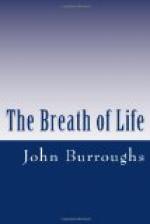Added to this wonder is the fact that the vital order has gone on unfolding through the geologic ages, mounting from form to form, or from order to order, becoming more and more complex, passing from the emphasis of size of body, to the emphasis of size of brain, and finally from instinct and reflex activities to free volition, and the reason and consciousness of man; while the purely physical and chemical forces remain where they began. There has been endless change among them, endless shifting of the balance of power, but always the tendency to a dead equilibrium, while the genius of the organic forces has been in the power to disturb the equilibrium and to ride into port on the crest of the wave it has created, or to hang forever between the stable and the unstable.
So there we are, confronted by two apparently contrary truths. It is to me unthinkable that the vital order is not as truly rooted in the constitution of things as are the mechanical and chemical orders; and yet, here we are face to face with its limited, fugitive, or transitional character. It comes and goes like the dews of the morning; it has all the features of an exceptional, unexpected, extraordinary occurrence—of miracle, if you will; but if the light which physical science turns on the universe is not a delusion, if the habit of mind which it begets is not a false one, then life belongs to the same category of things as do day and night, rain and sun, rest and motion. Who shall reconcile these contradictions?
Huxley spoke for physical science when he said that he did not know what it was that constituted life—what it was that made the “wonderful difference between the dead particles and the living particles of matter appearing in other respects identical.” He thought there might be some bond between physico-chemical phenomena, on the one hand, and vital phenomena, on the other, which philosophers will some day find out. Living matter is characterized by “spontaneity of action,” which is entirely absent from inert matter. Huxley cannot or does not think of a vital force distinct from all other forces, as the cause of life phenomena, as so many philosophers have done, from Aristotle down to our day. He finds protoplasm to be the physical basis of life; it is one in both the vegetable and animal worlds; the animal takes it from the vegetable, and the vegetable, by the aid of sunlight, takes or manufactures it from the inorganic elements. But protoplasm is living matter. Before there was any protoplasm, what brought about the stupendous change of the dead into the living? Protoplasm makes more protoplasm, as fire makes more fire, but what kindled the first spark of this living flame? Here we corner the mystery, but it is still a mystery that defies us. Cause and effect meet and are lost in each other. Science cannot admit a miracle, or a break in the continuity of life, yet here it reaches a point where no step can be taken. Huxley’s illustrations do




